Kristiāna Dimitere’s exhibition ‘Óasis’ will be on display from September 3 to October 13, 2024, at the gallery Alma, located at 64 Terbatas Street, Riga.
THE DONKEY OF BAKHCHYSARAI
I once received a call from a donkey. My surprise was so great that I still vividly recall his unusual story, replaying it in my mind over and over again. He claimed to be an experienced donkey who had spent his life happily carrying people and their heavy loads, learning from them many sad and a few joyful stories. When observing them, he always found the human hands the most fascinating – all the fingers moving in a myriad of ways while working, writing or playing music. The donkey said he had once met a veterinarian who, among other languages, understood the language of donkeys; the donkey asked him how he could get hands like that. He did not mind the hind legs staying as they were, but he longed to have his front legs swapped for hands like that. The veterinarian replied that he didn’t have the power to grant such a wish, but he recommended a certain fountain that, day after day, pours streams of tears so that people wouldn’t have to. Many who have dipped their hands, wings or paws into it have seen their wishes come true.
After several years of searching, the donkey finally found the fabled fountain in Bakhchysarai. The water flowing from the small basins along the wall indeed resembled weeping, and the wall itself seemed to breathe as if it were alive. Not wanting to disturb anyone, the donkey glanced around to ensure that there were no witnesses, then solemnly rose onto his hind legs, reaching out with his front legs to let the fountain’s tears wash over them.
The donkey’s chest trembled with excitement, and he even sniffled a little, feeling large tears welling up in the corners of his eyes. Closing his eyes for a moment, as if in a dream, he saw millions of hands raised in prayer toward the sky. All of them ascended into the heavens, and then God’s tears fell down to earth. Yes, the donkey insisted, they were God’s tears, because not even in dreams could raindrops dazzle with such silvery shine.
Opening his eyes, the donkey saw that the fountain’s cups had transformed into human hands. In a burst of astonished delight, he tried to clap, but the dry clack of his hooves brought him back to reality: he was still the same donkey with the same donkey legs. And yet, everything had changed, not just in the fountain, but within himself, and he felt a strong desire to hurry back to the people, to continue carrying their heavy burdens.
I forgot to ask why the donkey had called me specifically, as I was so enthralled by his story that my only focus was on capturing it as quickly as possible. I only managed to ask where the donkey was planning to go next. He replied that he was heading to a sun-scorched desert, where survival is toughest without help, and where the people, hardened by these challenges, are friendlier and wiser than those who dwell in the lush oases. And with that, our conversation came to an end.
I held the receiver, warmed by the donkey’s story, to my ear long after the call. He hasn’t called again, but in my thoughts, I still occasionally try to talk with him. When I do, I call him the Donkey of Bakhchysarai to distinguish him from the other donkeys whose stories I hear every day.
Curator: Astrīda Riņķe






























